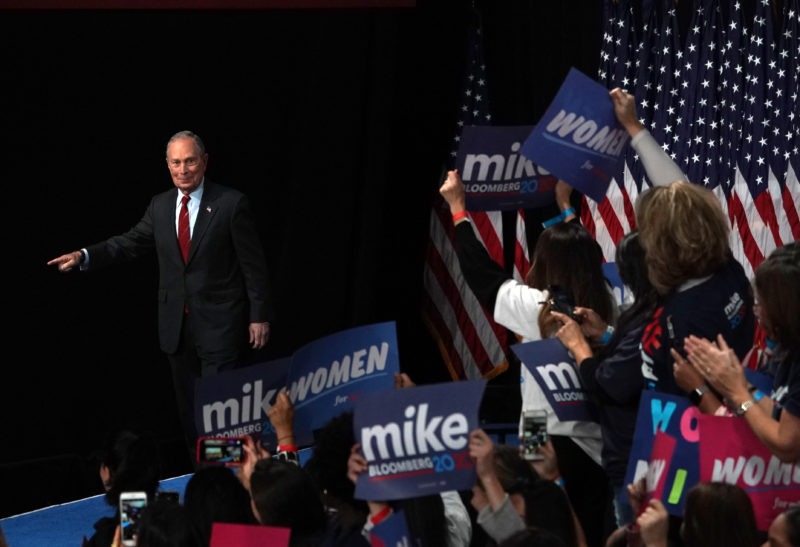Far from Iowa, Bloomberg climbs into 2020 contention
Democratic presidential candidate Mike Bloomberg arrives to speak at a kickoff event in New York January 15, 2020 to launch “Women for Mike,” a movement to energize women supporters across the country. (TIMOTHY A. CLARY)
New York (AFP) – One Democratic candidate surging in the polls who won’t be defined by the Iowa results, whatever they finally turn out to be, is billionaire Michael Bloomberg.
The ex-New York mayor chose to skip the first vote of the US presidential nominating contest, which was plunged into chaos Tuesday by technical glitches.
Bloomberg was given virtually no chance by analysts late last year when he added his name to the list of possible nominees to take on Donald Trump in November.
But less than three months on, backed by a bottomless budget and an unusual strategy, Bloomberg is surging in the polls, worrying his rivals — particularly fellow centrist Joe Biden.
Bloomberg, 77, entered the race for the Democratic nomination in November because he was concerned Biden was failing to put distance between himself and his left-wing competitors.
Unconfirmed results from Iowa confirmed his fears, with Biden apparently falling behind Sanders, a self-described democratic socialist who Bloomberg believes is too extreme to win the White House, and Pete Buttigieg, a mayor from Indiana.
Bloomberg — one of the world’s richest men — took the risky decision to skip the first four primaries, until now considered essential to becoming the Democratic 2020 flag-bearer.
Instead, he has focused his efforts, and millions of his own dollars, on a huge advertizing drive that he hopes will see him win key states voting on “Super Tuesday” next month.
Bloomberg has already spent a record $260 million of his personal fortune on the presidential campaign, sparking accusations that he is trying to buy the election.
An average of national polls conducted before Iowa shows the boss of the media company that bears his name in fourth place, behind Biden, Sanders and Massachusetts Senator Elizabeth Warren and ahead of Buttigieg.
The latest Morning Consult poll, also done before the Iowa vote, had him closing to within two percent of Warren.
That led Los Angeles Times columnist Jon Healey to write that the prospect of Bloomberg winning the nomination has gone from “inconceivable” to “a real possibility.”
He speculated that the campaign could come down to Sanders — backed by fellow leftist Warren — versus Bloomberg, backed by moderates Biden and Buttigieg.
Bloomberg’s campaign team claims it is building an electoral machine that is the most organized in American political history.
It now has almost 1,000 employees, including more than 350 at its headquarters in New York’s Times Square, according to a spokesperson.
At HQ, staff work under electronic displays which countdown to “Super Tuesday” on March 3 and presidential election day on November 9.
– ‘Mini Mike’ –
Fourteen states will vote on “Super Tuesday,” including California and Texas, which will send the most delegates to the July convention that will elect Trump’s challenger.
Bloomberg rarely drops into the headquarters. He has been crisscrossing the country, in particular visiting key swing states such as Michigan, Wisconsin and Pennsylvania, quietly laying out policies as the national media focuses on the early primaries.
Bloomberg has also gained support from a network of mayors who have worked with him previously on issues he has championed for years, such as gun control and climate change.
His recent announcements have included a program to increase home ownership among African-Americans as well as an initiative to boost economic prosperity for Hispanics, a group often stigmatized by Trump.
Bloomberg’s campaign events are far more subdued than those of Sanders and Warren, who rail against a “corrupt” establishment in front of thousands of supporters.
At a “Women for Mike” event in New York recently, where some 1,000 supporters had gathered, Bloomberg stayed for just 15 minutes.
He didn’t say a word about his opponents but made a couple of pointed jabs at Trump who has called him “Mini Mike.”
Bloomberg’s campaign received a boost recently when the Democratic National Committee (DNC) paved the way for him to take part in his first televised debate on February 19.
He was prevented from appearing in the earlier debates because he did not meet the threshold for individual donations but the DNC has changed the criteria.
Several candidates slammed the move, highlighting their growing fears over Bloomberg’s candidacy.
“Billionaires shouldn’t be allowed to play by different rules — on the debate stage, in our democracy, or in our government,” tweeted Warren.
Disclaimer: Validity of the above story is for 7 Days from original date of publishing. Source: AFP.


